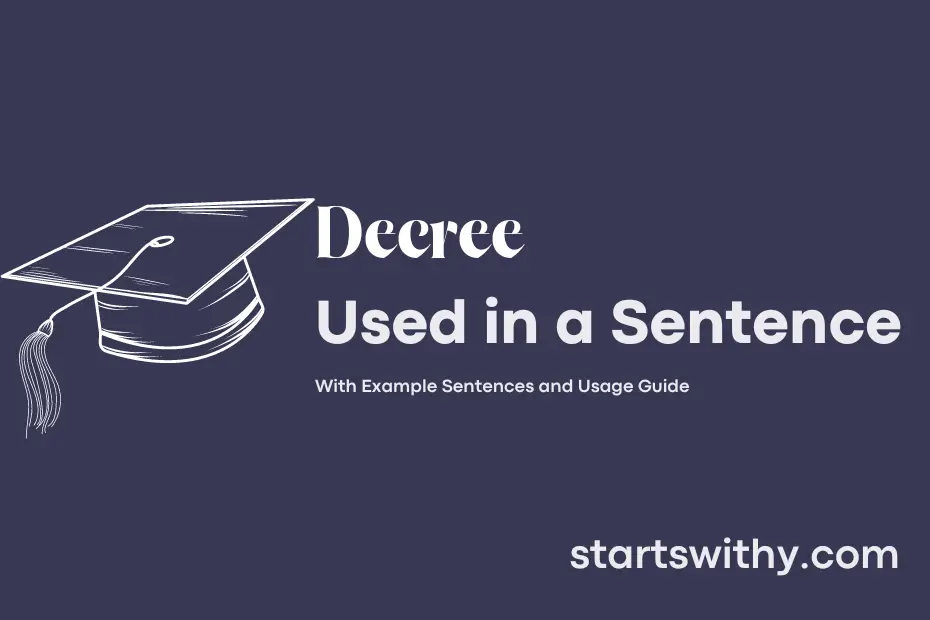Have you ever wondered what a “decree” truly means in legal terms? A decree is a formal and authoritative order issued by a legal authority. In legal contexts, decrees are often utilized to establish rules, settle disputes, or provide guidance on specific matters.
Decrees carry the weight of law and are typically enforced by the governing body that issued them. They can come from various authorities such as judges, governmental bodies, or regulatory agencies. Understanding the implications of a decree is crucial in navigating legal processes and ensuring compliance with the law.
7 Examples Of Decree Used In a Sentence For Kids
- The king made a decree for everyone to wear their best clothes to the royal gathering.
- The teacher decreed that no running was allowed in the classroom.
- The principal decreed that all students must wear school uniforms every day.
- The mayor decreed that no littering was allowed in the park.
- The queen decreed that a grand feast would be held for all the villagers.
- The judge decreed that everyone must speak the truth in court.
- The president decreed that a new holiday would be added to the calendar.
14 Sentences with Decree Examples
- Decree from the university stated that all students must maintain a minimum attendance of 75%.
- Students eagerly awaited the decree regarding the postponement of exams due to inclement weather.
- The college administration issued a decree mandating the use of academic integrity software for online exams.
- The student council put forth a decree proposing extended library hours during exam season.
- A new decree announced the introduction of a mandatory internship program for all final year students.
- The academic decree outlined the guidelines for submitting research papers for publication in college journals.
- The college association’s decree highlighted the importance of mental health awareness among students.
- The decree regarding the implementation of a new grading system sparked mixed reactions among students.
- The student body welcomed the decree allowing for flexible course selection based on individual interests.
- The department’s decree on industry collaborations paved the way for students to gain practical experience through internships.
- A recent decree mandated the establishment of a student grievance redressal cell to address concerns promptly.
- The decree emphasizing the need for sustainable practices on campus prompted students to initiate eco-friendly initiatives.
- Students hoped for a favorable decree regarding the reduction of tuition fees in view of the current economic challenges.
- The decree outlining the eligibility criteria for scholarships encouraged students to excel academically.
How To Use Decree in Sentences?
Decree is a formal and authoritative order issued by a person in authority. Decree is typically used in legal contexts to refer to a judgment or decision made by a court. Here is a guide on how to use decree in a sentence for beginners:
-
Decree is a powerful word that should be used to convey a formal decision or order. For example, “The judge issued a decree ordering the company to pay compensation to the plaintiff.”
-
To use decree in a sentence, start by introducing the subject that is making the decision or order. For instance, “The king’s decree banned hunting in the royal forest.”
-
Next, describe the actual decree being issued and its implications. For example, “The city council passed a decree requiring all residents to recycle their waste.”
-
You can also use decree in a more casual context to mean proclaim or announce. For instance, “She decreed that the party would be held in her backyard.”
-
Make sure the context fits the formality and gravity of the word decree to ensure the sentence is accurate and appropriate.
By following these guidelines, beginners can effectively incorporate decree into their writing and speech to convey authoritative decisions or orders.
Conclusion
In conclusion, sentences that contain the word “decree” often convey authoritative instructions, official orders, or legal declarations. These sentences typically express a formal or commanding tone, as decrees hold significant power and influence over a particular matter. Whether issued by a government, court, or ruler, decrees serve as pronounced and binding directives that must be followed and respected by those to whom they apply.
Throughout history, decrees have played a crucial role in shaping societies, establishing laws, and governing affairs. From political decisions to religious proclamations, sentences incorporating the term “decree” underscore the weight and impact of such official announcements. By examining sentences featuring this keyword, we can gain insight into the forceful and decisive nature of decrees and the pivotal role they play in regulating various aspects of human interaction and governance.



